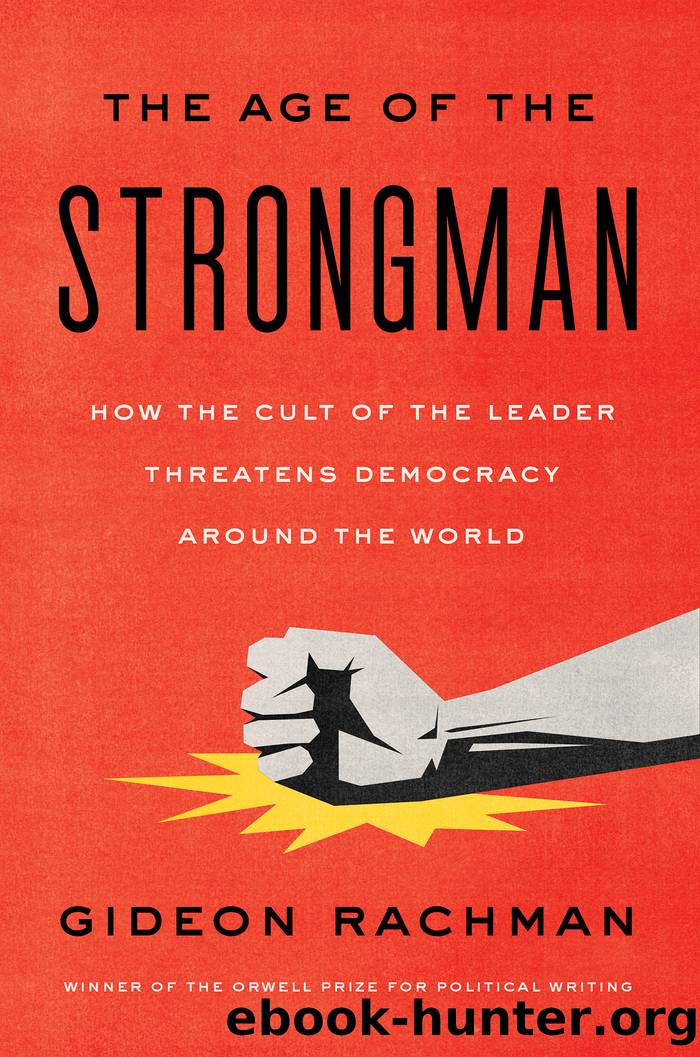The Age of the Strongman by Gideon Rachman

Author:Gideon Rachman [Rachman, Gideon]
Language: eng
Format: epub
Publisher: Other Press
Published: 2022-04-12T00:00:00+00:00
Skip Notes
* After her release in 2010, Suu Kyiâs complicity in the brutalisation of Burmaâs Rohingya minority was a source of disillusionment to many in the international community. But Burma remained a democracy. It was the military anger at the outcome of elections in 2020 â accompanied by Trump-like accusations of fraud â that prompted the coup of 2021.
9 The rise of MBS and the Netanyahu phenomenon (2017)
When Donald Trump was sworn into office in January 2017, there was a sense of foreboding in much of Europe. But the leaders of Americaâs two closest allies in the Middle East â Israel and Saudi Arabia â were elated. Benjamin Netanyahu, the prime minister of Israel and Crown Prince Mohammed bin Salman of Saudi Arabia, both regarded the Obama administrationâs policies in the region as dangerously naive. With Trump in the White House, they once again had a US president who would prioritize regional stability over democracy and harden policy towards Iran.
Bibi and MBS â to use the nicknames by which they are always known â are key figures in the Age of the Strongman. Both came to personify the politics of their nations more completely than any of their recent predecessors. In July 2019, after thirteen years in office, Netanyahu became Israelâs longest serving prime minister, taking the accolade from the countryâs founding father, David Ben-Gurion.
Mohammed bin Salman arrived on the scene only relatively recently: he entered government in 2015 and was formally appointed as crown prince in 2017. But he too is a transformational figure. In the modern era, the leadership of Saudi Arabia has never before been so closely identified with a single, charismatic individual. The new Saudi strongman has swept away the old system of collective royal leadership, based around seniority, consensus and a parceling out of portfolios among princes. By 2018, as his biographer Ben Hubbard explains: âMBS had destroyed that (traditional) system, extending his control over the military, the oil industry, the intelligence services, the police and the National Guard.â[1]
The centralization of power and the identification of leader and nation â both at home and abroad â is a characteristic of the Age of the Strongman. Bibi and MBS are strongly nationalistic leaders, with a powerful streak of paranoia about the outside world. Their shared antipathy towards Iran and eagerness to work with the Trump administration remade the geopolitics of the Middle East between 2016 and 2020.
Despite the similarities in their strategic aims and temperaments, the political and even physical environments in which Saudi and Israeli leaders operate are distinctly different. The opulence of the living conditions of Saudi royalty is unrivaled. Among the baubles that Mohammed bin Salman has bought for himself is a chateau outside Paris, costing $300 million.[2] Visitors received by the crown prince in Riyadh are often awestruck by the regal splendor of his surroundings â as they are intended to be.
By comparison, the prime ministerâs working quarters in Jerusalem are distinctly spartan. When I visited Netanyahu there in 2013, his office was in an unattractive but well-guarded block, at the top of a flight of stone stairs.
Download
This site does not store any files on its server. We only index and link to content provided by other sites. Please contact the content providers to delete copyright contents if any and email us, we'll remove relevant links or contents immediately.
| Anarchism | Communism & Socialism |
| Conservatism & Liberalism | Democracy |
| Fascism | Libertarianism |
| Nationalism | Radicalism |
| Utopian |
The Secret History by Donna Tartt(19086)
The Social Justice Warrior Handbook by Lisa De Pasquale(12190)
Thirteen Reasons Why by Jay Asher(8909)
This Is How You Lose Her by Junot Diaz(6885)
Weapons of Math Destruction by Cathy O'Neil(6279)
Zero to One by Peter Thiel(5801)
Beartown by Fredrik Backman(5754)
The Myth of the Strong Leader by Archie Brown(5507)
The Fire Next Time by James Baldwin(5442)
How Democracies Die by Steven Levitsky & Daniel Ziblatt(5218)
Promise Me, Dad by Joe Biden(5153)
Stone's Rules by Roger Stone(5087)
A Higher Loyalty: Truth, Lies, and Leadership by James Comey(4960)
100 Deadly Skills by Clint Emerson(4924)
Rise and Kill First by Ronen Bergman(4788)
Secrecy World by Jake Bernstein(4752)
The David Icke Guide to the Global Conspiracy (and how to end it) by David Icke(4717)
The Farm by Tom Rob Smith(4507)
The Doomsday Machine by Daniel Ellsberg(4490)
